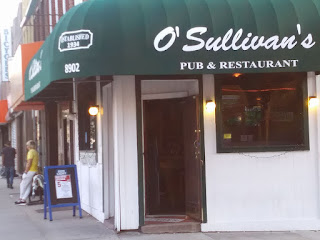Cards and Letters

I don’t expect much in the way of surprises anymore when I open my mailbox.
With everything shifting to the Internet, all I usually find in there when I come home at night are bills, junk mail and menus from just about every restaurant in North America.
But last week I learned that conventional mail can still hold a few jolts.
The first one actually came to my family's old house on 86th Street some 66 years ago in the form of a post card from my Uncle Walter to my Aunt Marie.
My uncle was a pilot during World War II and he was writing to my aunt from the air base in Lawrenceville, Ill. There is a photo of Beechcraft Trainers on the front of the card and it is postmarked Feb. 19, 1944.
The card came fluttering off a bookshelf in my bedroom while I was rearranging some paperbacks. I must have put it up there a long time ago for safe-keeping and, as usual, forgot all about it. I certainly don't remember reading it before.
It's just a couple of handwritten lines, but looking back over all these years, they carry so much power and emotion.
“Dear Marie,
How are you? I hope you are all right and that everyone else is, too. How is Kerry? Better, I hope. Tell Mom I am all right and tell Glo I’ll write her tonight. Be a good girl and I’ll bring you home some wings when I come home.
Be careful. Love, Walter.”
Let me identify some of the names here. Kerry was the family dog, who died before I was born, but who was the subject of so many glowing stories that he was a living part of my childhood. Mom was my grandmother.
And, Glo, well, that would be Gloria, my mother.
I get a chill every time I read this postcard, as it brings the distant past so vividly to life. The message is so personal, but it is also a piece of history.
It shows another side of my family that I know so little about. I can’t begin to imagine what it must have been like for my grandmother, aunt and mother as they prayed for Walter's safe return.
It’s funny to read as my uncle, who will turn 90 this year, tells my aunt to be a good girl and promises to get her a pair of wings.
And the words “be careful”—from a man who flew bombing missions over Europe.
This was about the only way people could communicate back then. There was no email, Twitter, IM or cell phones. When people serving in the military wanted to write home, they sat down, picked up a pen and started writing. And their families watched their mailboxes anxiously every day.
I realize how lucky we were that my uncle returned from the war. A lot of soldiers wrote about what they would do when they came home--but they never did. For so many families these cards and letters would be the last thing they ever heard from their loved ones.
You've Got Mail
And it seems fitting that on the same day I found this postcard, I received a letter from a woman in Pennsylvania who had seen me on CNN when I had read my father’s poem about World War II.
Her name is Gertrude. She was born in Germany in 1942 and had come to the United States when she was eight years old.
“After seeing you and listening to you read your father’s poem,” she wrote, “I just need to thank you for sharing it.”
Gertrude explained that Memorial Day for her has always been “a somewhat ambivalent day ever since I came to the U.S. and began to participate in our small town’s Memorial Day parade.”
“It was a…complex situation,” she continued, “to be both grateful and at the same time feel guilt, perhaps more shame, to come from a country that caused so much death and destruction.”

Gertrude’s father was a solider in the German army, driving munitions to the Russian front and returning with refugees trying to escape the oncoming Soviet troops. He was eventually taken prisoner by the British.
She told me about her aunt in Germany, who had two of her sons killed in action in Russia, while a third died at home from meningitis. Gertrude said she used to Internet to locate the places where these young men had died and learn some of the history behind the battles.
“Somehow it helps to know these little pieces of information,” she wrote. “However, what is even more helpful is knowing that there are other soldiers, like your father who can look into the eyes of his enemy and find the compassion to see his fear, ask for his forgiveness and call him his brother.”
Gertrude said there her belief in God “assures me that your father is now in the loving embrace of his creator along with that young German solider.”
When she was 50 years old, Gertrude completed her undergraduate degree and a Masters of Social Work degree and went on to work with Vietnam veterans suffering from post-traumatic stress syndrome.
“As the mother of three sons,” she wrote, “I have been haunted all of my life, not just about the possibility of more wars, but that my sons would have to fight those wars.”
Gertrude said that she hoped my father had a rich and rewarding life after the war and she ends her letter by thanking me again for sharing his poem.
“It has touched me to the very core of my being,” she wrote, “a true gift at this stage of my life.”
And, Gertrude, your letter was a true gift to me. Thank you so much for writing it.



Comments
And well done on your CNN appearance!